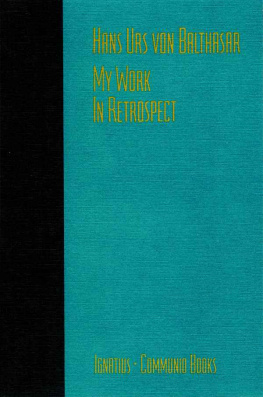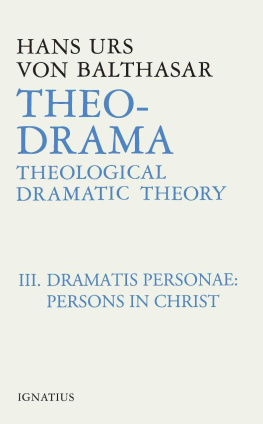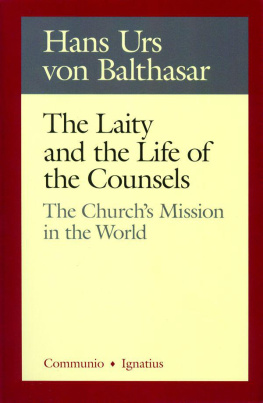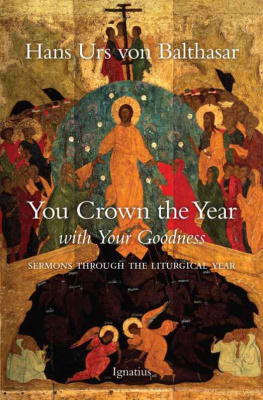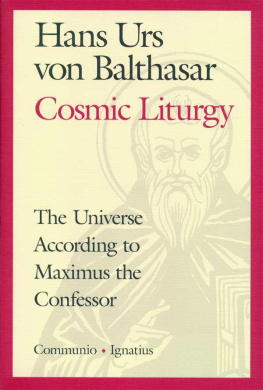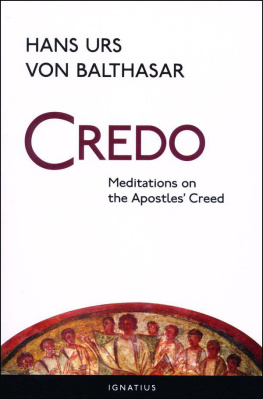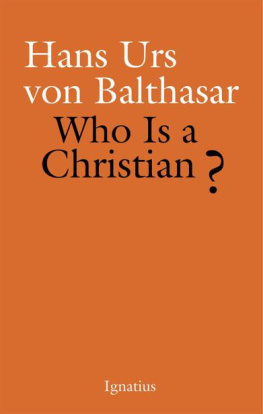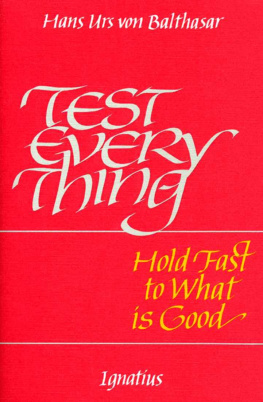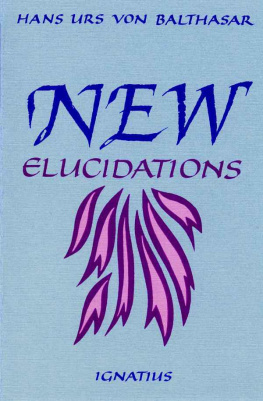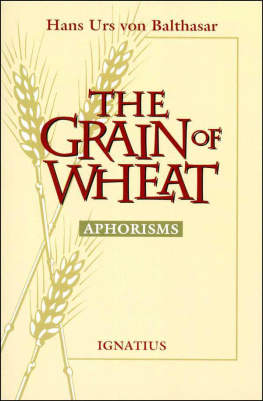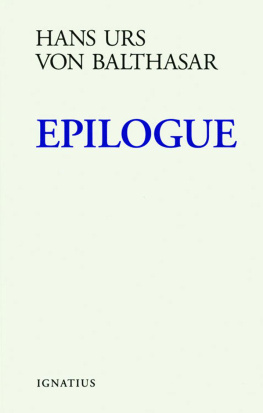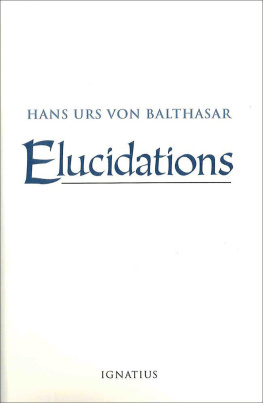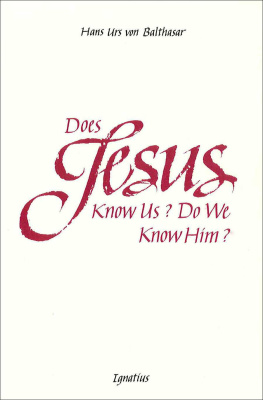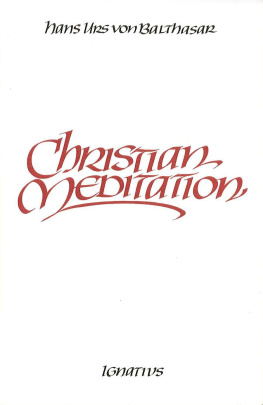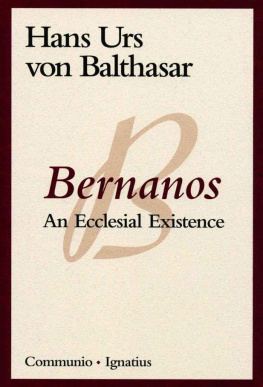Hans Urs von Balthasar
My Work: In Retrospect
HANS URS VON BALTHASAR
My Work:
In Retrospect
COMMUNIO BOOKS
IGNATIUS PRESS
Title of the German original:
Mein WerkDurchblicke
1990 Johannes Verlag
Einsiedeln, Freiburg
Cover by Roxanne Mei Lum
1993 Ignatius Press, San Francisco All rights reserved
ISBN 978-0-89870-435-8
Library of Congress catalogue number 92-74535
Printed in the United States of America
CONTENTS
I An Introduction:
Hans Urs von Balthasar: 1945
1. The Salient Point
2. Rays from the Center
3. A Church of Disciples
4. The Glory of the Lord
5. A Word of Thanks
FOREWORD
Hans Urs von Balthasar made detailed statements about his work on five occasions, mostly on the birthdays that marked the end of a decade of his life: as a young author, in his desire to lift out of the jumble of history the four or five figures who, taken together, represent for me the constellation of my idea and my mission; as publisher and writer, out of concern for the reader and in order to equip this reader with a guide to the quickly spreading thicket of books written and published by him. Then, in the midst of the transformations and new beginnings connected with the Council, he wrote In Retrospect for himself and for all his readers, inside and outside the Church, about what had been given and what had been done and what was still required and planned. Finally, in a kind of pause, as one already looking toward the close of his life, he gave once again an account of what had been achieved and what could no longer be achieved, in a clear shift of emphasis away from his authorship in favor of pastoral work in the communities he had founded. A few weeks before his death, he attempted once more a glimpse through my thinking, a simple and clear text that is only a few pages long. In the meantime, he had also been able to complete his trilogy.
This present volume is a helpful guide to his many-layered work.
CORNELIA CAPOL
I
An Introduction:
Hans Urs von Balthasar
1945
One of the great blessings of God is that no one sees himself as he really is; even when he looks at himself in a mirror, he sees himself in a reversed mirror image. But others, who discover much in him that he does not know, in turn know little of what he himself knows about himself. And thus ultimatelyif we prescind from the omniscience of Godthe least unreliable measure of a man remains his work. You will know them by their fruits, and yet, since these fruits can be deceptive, you will not judge them by these. Thus, all that a writer can do is to send his books to the front, if he is to give information about himselfeven if he can only laugh at these advocates, who correspond so little to what he fundamentally would have wanted to say. He is the ungrateful man who, like the Spartan of old, exposes the newborn behind the nearest bush, already planning (like some Don Giovanni of the spirit) to bring something new and better-shaped into the world.
Nothing is so delightful as the ability to lift out of the jumble of history the four or five figures who, taken together, represent for me the constellation of my idea and my mission: so we read in a certain book called Weizenkorn (The grain of wheat). was intended to allow his inner image to appear afresh in all its bold sublimity, and this book, which has received little recognition, seems to me even today the weightiest of all I have published.
A wider panorama opened up from this point, backward to the glorious Irenaeus, And so the obscure and steep
Maximus the Confessor offered a concluding synthesis of the patristic world of the spirit ( Kosmische Liturgie [Cosmic liturgy], which attempted (to the insuperable horror of all right-thinking specialists) to present in a total Christian interpretation poetry, philosophy and theology from Lessing to the present day. I readily admit that even I find this giant child somewhat monstrous; I often ask myself, when I see it on the bookshelf, what its contents may be. Perhaps it contains too muchbut much of it was written at that time with my hearts blood.
Everything, then, was running true to course, and it seemed that I, as collaborator of a periodical in Munich, was destined to become the perpetual student of the intellectual sciences. But the boots of the SS sounded ever more loudly from the nearby Ludwigstrasse, and no ear could escape the loudspeakers that were set up everywhere in the city. The area around the old Hofbruhaus became eerie and terrible, and I was glad to be offered the position in Switzerland that transferred me to direct pastoral work. Fresh student life brought new life into unrealistic theoretical knowledge, and the little time that still remained at my disposal was now used for a looser form of publication. A publishing firm in Basel wanted a series of books that would preserve the cultural heritage of the West: Was there any reason to refuse such a rewarding task? My old love for the great Catholic poets of France awakened anew: Why not make them familiar to the German reader in worthier dress? Thus the translations of Paul Claudels Cinq grandes odes , for seldom has a book drawn so fully from the patrimony of the greatest Christian tradition.
But preservation and translation could not be the whole task. The tree of tradition must put forth new branches; why should the one who gives form to what has been handed down from the past never do anything more than express his own thought through other peoples voices? For now it suddenly seems to him that he himself has not yet said anything. Modestly, therefore, he begins to bind into a bouquet a few truths that he himself is perhaps the first to grasp fully in their undeveloped power ( Das Weizenkorn ), (not a book about Christ, as the publisher wrote on the jacket). All this is scarcely more than a beginning: the greatest part still remains unsaid. How much in theology still needs to be given a new form, in order to lead todays man anew to the most vital dimension of God, of Christ, of the Church! How much remains to be done for the encounter of modern thought with patristic and scholastic thinking! Every time one opens the Bible, it seems to require interpretation anew! Few verses have remained more alive in my consciousness than the monologue of the goldsmith in Hofmannsthals Kleines Welttheater , when he looks down from a high bridge into the strong and swiftly flowing waters; he thinks he sees the body of the night:
Now she unwinds her limbs; and now they throng,
Reel into wild and separate commotion,
A drunken urge possesses me: I long,
My fingers itch, to mould those images,
Yet there are far too many, and all true;
One rises up, the others melt away.
Never Ill hold that flux, until I learn
To isolate one shape and make it stay....
And yet, at the moment when everything that is formed and delimited is isolated in the work, it no longer seems to be living wholly out of the great life of God, and so we give it back and return it to this infinite sea of truth, grateful that we have been permitted at least for a moment to share in giving it a form, in obedience to a mission and a task, so that it may become a guiding image for someone else, if God permits. All is yours, but you are Christs: I would like to have these words set as the motto over what I have done.
I
A Short Guide to My Books
1955
One who turns fifty and has written a great deal that is apparently very disparate may well have cause to reflect: not least out of concern for the reader, who is his, neighbor, for the most part an unknown person who comes into contact with the author when he reads something the author finished long before and bestows a new presence on something that lies far away in the past. Out of concern, therefore, to make things easier for him by indicating the connections and intentionsin the literary work, not at all in the work of his life, whose decisions lie somewhere else again, and at a deeper level. It is not possible to make a clean separation between these two; a book must reflect much of the meaning that the writer seeks to give his own existence, even if this meaning is rather often stamped on the book against the direct will and supposition of the author. The magnet that hangs over him follows incomprehensible laws as it shifts its position, and all the filings change their place and form a new pattern with a plan that does not He in the filings themselves. Whoever has truly experienced this gives up the attempt to bring his literary work into harmony with his life; when he writes, he is ahead of himself in a dream of the totality in which he would like to give his fragments a sure home; then once more he limps along behind his own self, or even creeps backward and looks around, like Lots wife, into a beloved image of the past, an image that entices all the more magically since it is already ablaze.... Who can keep up? I was touched early in my life by Schillers insight that the past is not something firm and closed but can be shaped through the decisions of the present; this is the hope of one who drags along the ever heavier chains of his books. He inevitably remains for the public the man of his past works, whereas it is only with reluctance, indeed, with anxiety, that he himself touches one of these snakeskins that betray to him with certainty that he no longer stands at that point, that he has long since become another man. He was the man of this idea, as it rose fresh in him, but only half that, as he reduced it to the form of a book and wrote this book in impatience to be finished with itbut afterward? Perhaps one robs oneself of the last credit one possesses in the eyes of ones readers when one makes such confessions; but is it not better for me to come right out and confess that I am an impatient man for whom one thing is beyond question: namely, that the book that has just been finished contains (once again) nothing of what absolutely ought to have been said, shown and made perceptible? The next book will be the product of desperation over the last one. This bitter pill brings calm; it is the penance I gladly undertake for that one excessive drop of delight that lies in all writing. It is superfluous to say that this is why I do not wish to be tied down to any of those forms I have traced in monographs in the course of the years, no matter how dear most of these remain to me, no matter what mysterious constellations they form through their mutual relationshipsconstellations that can suddenly be overwhelmingly clear for the one who studies them with even a little more love and yet remain only arbitrary rigid lines in that endless sparkle of light that no eye will ever be able to shape into constellations: the community of saints.
Next page
